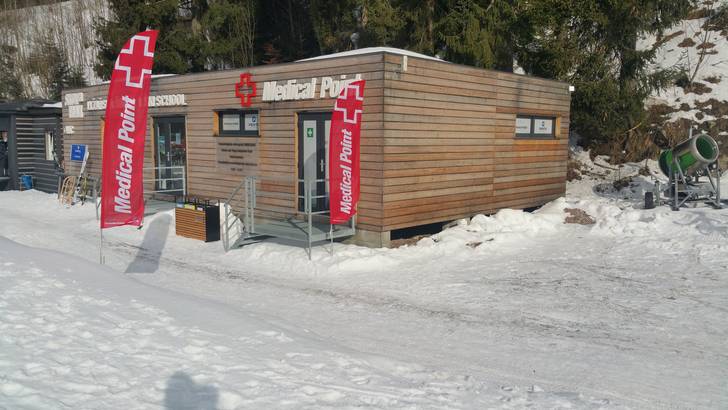Medical Point
Immediate medical assistance available at Svatý Petr throughout the entire winter season.
currently closed!
Traumatology - Surgical AMBULANCE
- free treatment - contractual partner of health insurance companies
- Care provided by Vrchlabí hospital
- Directly on the slopes at Svatý Petr
 Before skiing or snowboarding, you should consider the difficulty of the terrain, the equipment, your own abilities and the number of people on the slopes - all these factors can potentially cause you to fall or injure yourself (the most common skiing injuries are to the lower limbs, knees, concussion and cuts, while the most common snowboarding injuries are to the upper limbs – the wrist, collarbone and shoulders).
Before skiing or snowboarding, you should consider the difficulty of the terrain, the equipment, your own abilities and the number of people on the slopes - all these factors can potentially cause you to fall or injure yourself (the most common skiing injuries are to the lower limbs, knees, concussion and cuts, while the most common snowboarding injuries are to the upper limbs – the wrist, collarbone and shoulders).
Safety equipment is essential – a helmet is the minimum requirement (it reduces the risk of a serious head injury by up to three times), but you should also consider using a spinal back protector as well as wrist and forearm protectors. This protective equipment is also beneficial when sledging and bobsleighing. Remember to bring all your regular medicines and it is vitally important to have your health insurance card with you when participating in sporting activities in the mountains.
Hypothermia – this is a dangerous drop in body temperature below 35° caused by exposure to cold weather (this can vary according to body condition, acclimatisation or each individual’s ability to respond to changes in temperature). The most common causes of hypothermia are low winter temperatures in the exposed mountains, especially when combined with cold rain, snow and wind. The body responds to cold by narrowing the smaller blood vessels in the skin to reduce blood flow and retain heat for the central body systems, especially the vital organs. Prevention: if you are planning a winter trip and there is the possibility of bad weather, you must be in good physical shape (even a very mild illness can be dangerous), and wear multi-layered clothing and a waterproof jacket or coat. Have your clothing loose at the neck and around the wrist (to permit perspiration to evaporate freely), replace damp socks with dry ones, consume a high-calorie diet and don’t smoke or drink alcohol.
Frostbite – this can result from exposure to extreme cold and usually affects the body‘s extremities. This is caused by the narrowing of the lumen of the vessels exposed to cold over a period of time. Prevention: it is important to wear appropriate clothing and gloves, and expose the minimum skin area possible to the cold (for the shortest possible time). Do not cover your face with a scarf, balaclava or other form of cloth into which you breathe because the water produced by breathing can freeze on your face to cause frostbite. Use protective creams that are based on water-in-oil emulsion. In winter, the skin dries in the cold air. The cream‘s water particles are contained in an oil film whose active substances hydrate the skin and leaves a thin layer of protection to block frost, wind or dust particles. If you are involved in a skiing or snowboarding accident or a situation in which somebody loses consciousness and requires immediate assistance, do not delay potentially life-saving first-aid treatment, including emergency resuscitation (heart massage), before the Mountain Rescue or other emergency services arrive.

